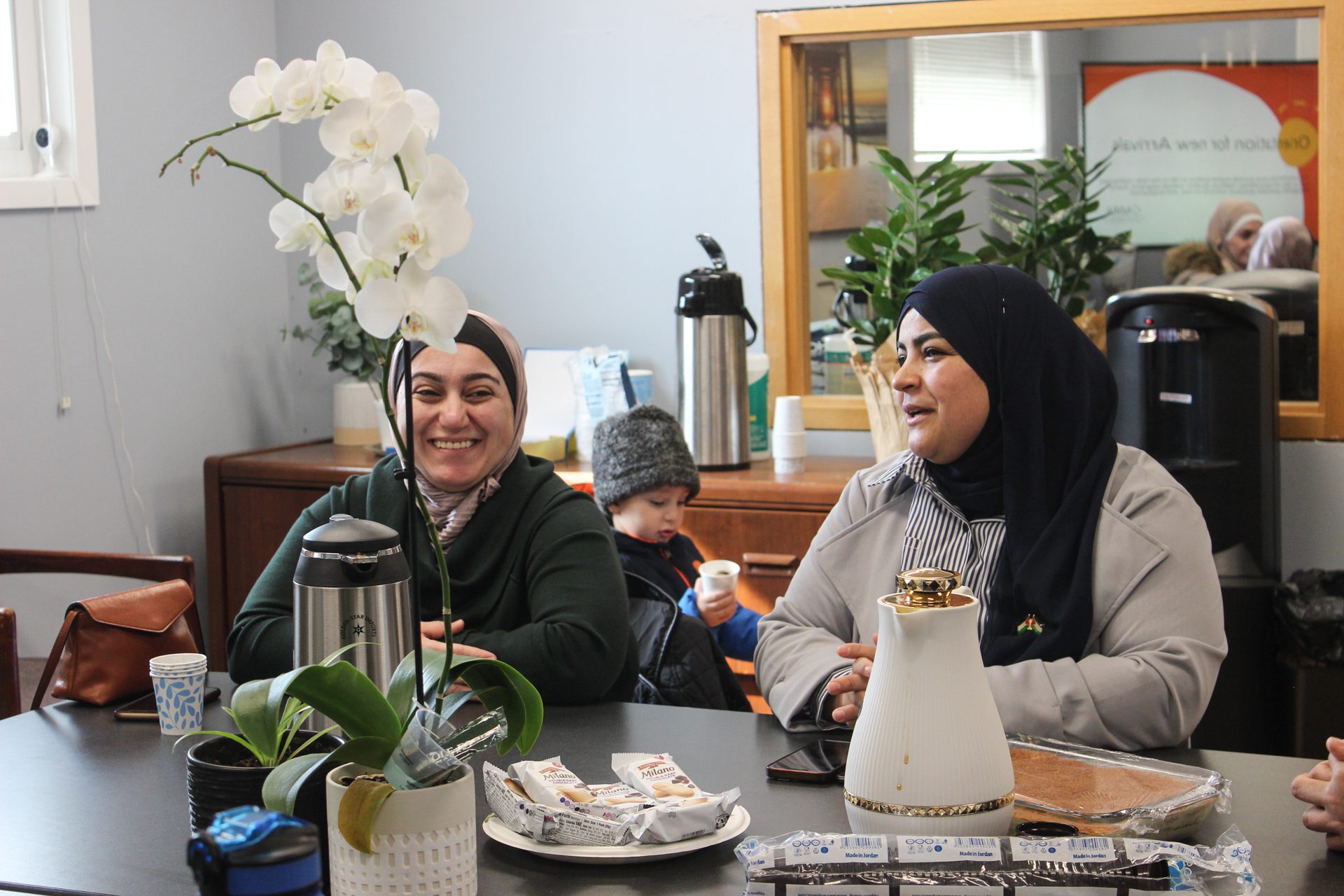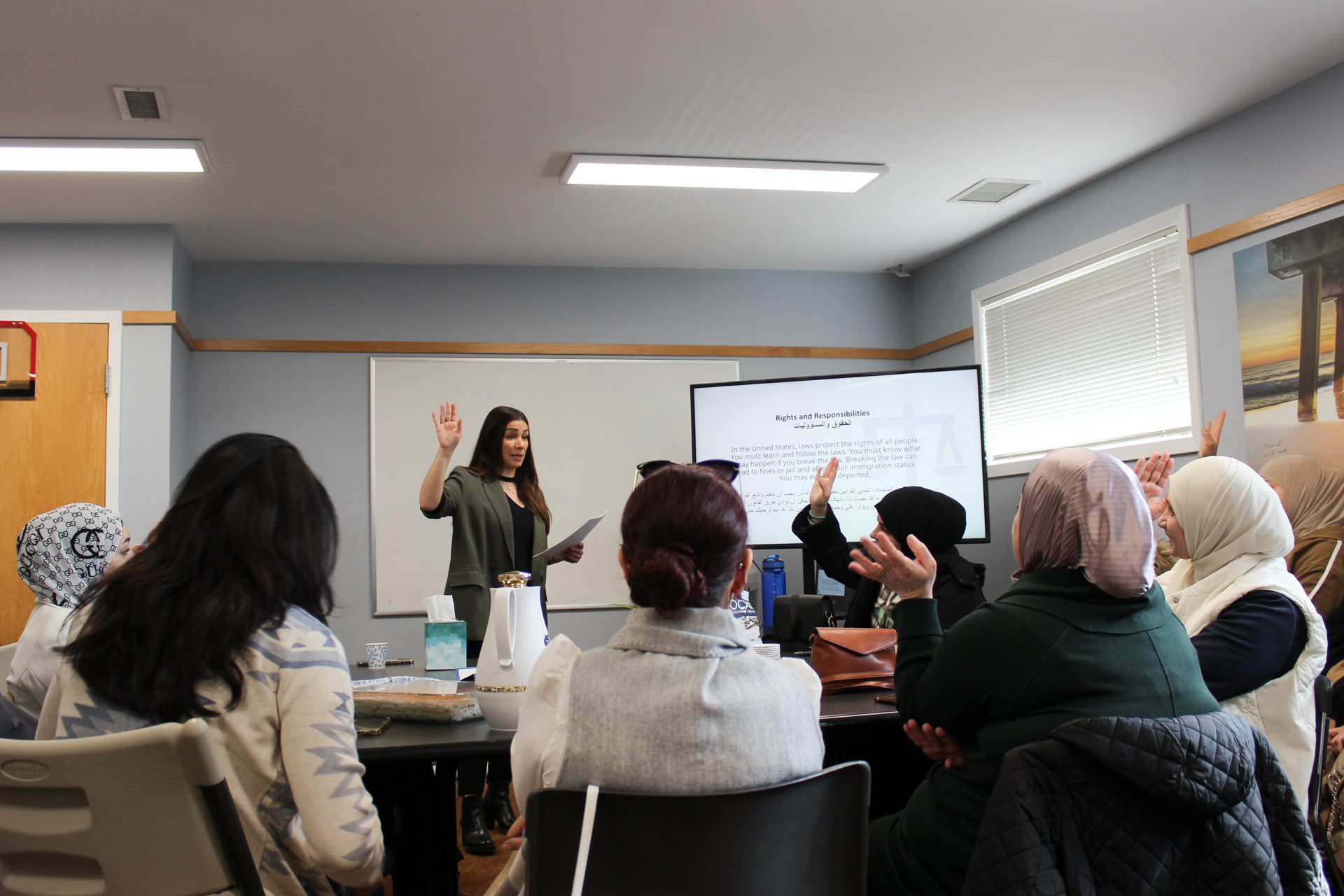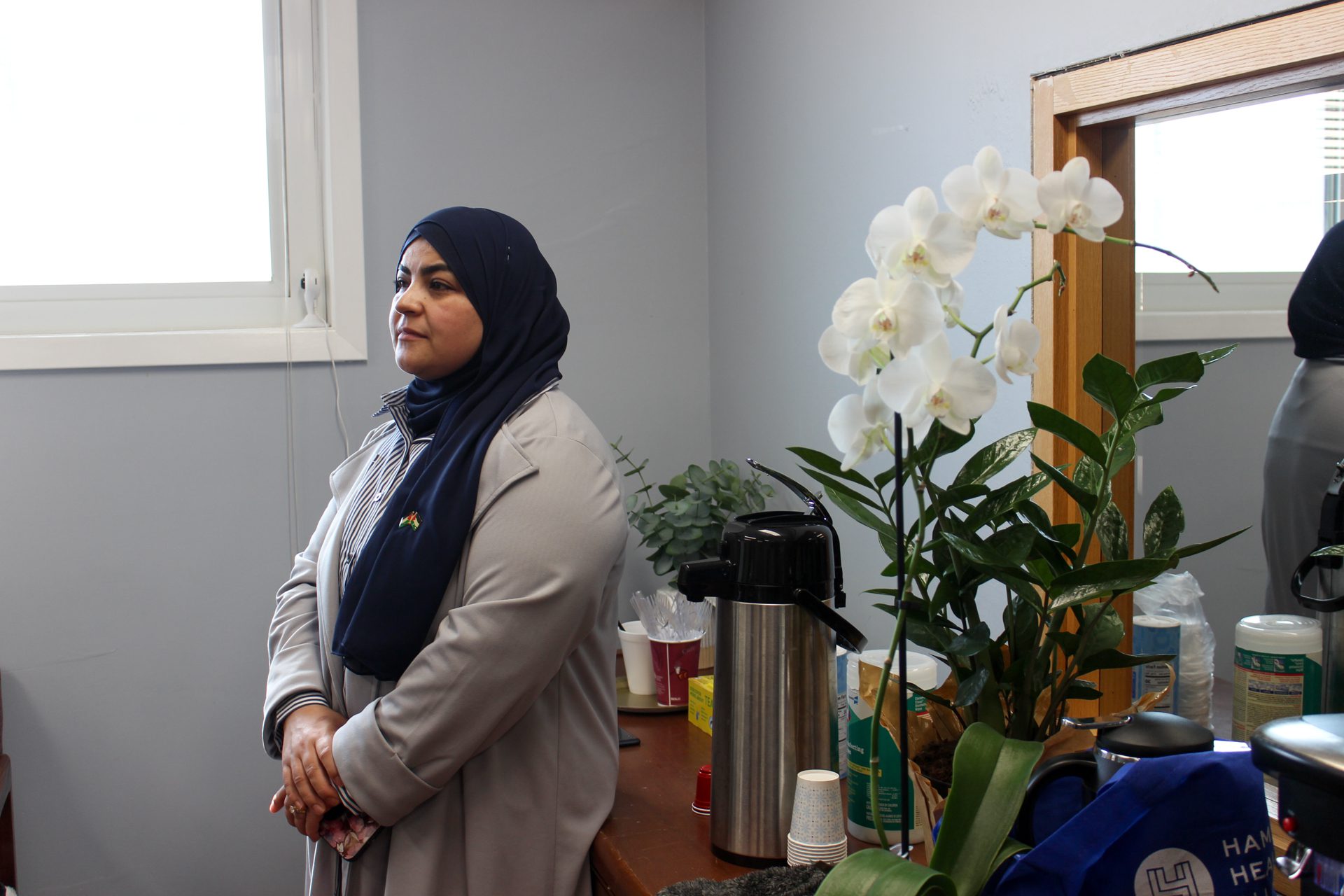 Diane Bou Khalil/Revista sin fronteras
Diane Bou Khalil/Revista sin fronterasLa Alianza de Inmigrantes y Refugiados de Oriente Medio (MIRA) puso en marcha el pasado otoño un grupo de empoderamiento femenino para fomentar la comunidad y enseñar habilidades esenciales para la vida.
Doha Lahlah aún recuerda las preocupaciones que pesaban sobre su mente durante los días y semanas previos al traslado de su familia de Jordania a Chicago.
Lo desconocido de un lugar nuevo, la barrera del idioma y el hecho de dejar atrás un sistema de apoyo en plena pandemia de COVID-19 eran preocupaciones que le quitaban el sueño.
"Lo más difícil fue imaginar cómo sería esta nueva vida", recuerda Lahlah sobre la mudanza. "Todo es único para ti. La gente. La vida. El idioma. El entorno. El aire. El tiempo. Todo era duro".
Noticias que ponen el poder en el punto de mira y a las comunidades en el centro.
Suscríbase a nuestro boletín gratuito y reciba actualizaciones dos veces por semana.
En los días siguientes a su llegada a Estados Unidos, Lahlah, nacida en Siria y trasladada a Jordania, recordaba cómo intentaba equilibrar el sustento de su familia con la navegación por un nuevo país. En medio de lo desconocido, Lahlah se encontró en la oficina de la Alianza de Inmigrantes y Refugiados de Oriente Medio (MIRA, por sus siglas en inglés) en West Ridge, obteniendo respuestas a las acuciantes preguntas de su familia.
Esta organización sin ánimo de lucro ofrece servicios jurídicos, educación, gestión de casos y apoyo en salud mental a comunidades de inmigrantes árabes y de Oriente Medio de la zona de Chicago. El otoño pasado, la organización puso en marcha un programa de empoderamiento de la mujer para fomentar la comunidad y proporcionar habilidades esenciales para la vida. El programa ha sido un faro de esperanza para mujeres como Lahlah, que intentan encontrar estabilidad en un lugar nuevo.
Gracias a la ayuda de MIRA, Lahlah se ha convertido recientemente en profesora de costura en ICNA Relief. Los responsables de MIRA animaron a Lahlah a solicitar una subvención para ayudarla a poner en marcha un negocio de diseño artesanal.
"MIRA nos pidió lo que necesitábamos, que era comprensión y orientación en nuestro idioma", dijo Lahlah, señalando que a veces los sentimientos se pierden en la traducción. "Reconforta y fortalece saber que alguien que pasó por algo parecido lo superó".
Atender las diversas necesidades de una comunidad vulnerable
Fundada como la Sociedad Iraquí de Ayuda Mutua por refugiados iraquíes recién llegados en 2009, el grupo se formó en respuesta a los retos a los que se enfrentaban mientras se adaptaban a sus nuevas vidas en Estados Unidos. En la última década, la organización ha evolucionado para prestar numerosos servicios a refugiados e inmigrantes recientes de Oriente Medio. Uno de esos programas es el de empoderamiento de la mujer.
MIRA organiza sesiones mensuales para mujeres inmigrantes y refugiadas de habla árabe, tanto recién llegadas como que llevan años aquí. Es una forma de animar a las mujeres a relacionarse y socializar y a aprender habilidades vitales esenciales para llevar una vida mejor desde el punto de vista emocional, económico, mental y físico, explica Muntaha Alhindi, trabajadora social y directora del grupo de apoyo a la salud mental de las mujeres de MIRA.
Alhindi lo entiende porque ha estado en su lugar.
En 1999, Alhindi llegó a Estados Unidos procedente de Palestina. Recuerda la dificultad de adaptarse a un nuevo país y a una nueva vida. Experimentó los mismos retos a los que se enfrentan actualmente los miembros del grupo, como aprender un nuevo idioma y seguir una educación mientras crían a sus hijos.
"Tenía clases a tiempo completo en la UIC y unas prácticas a tiempo completo en Arab American Family Services", cuenta Alhindi. "Solía volver a casa después del trabajo y las clases muy cansada. Preparaba la comida para mis hijos, comíamos juntos y luego me sentaba en el salón, les ayudaba con los deberes y también hacía mis propios deberes. Como el inglés no es mi lengua materna, me resultaba difícil. Los deberes que a un estudiante estadounidense le llevarían una hora, a mí me llevaban cuatro o cinco".
Recordar algunos de esos retos es la razón por la que Alhindi creó el grupo de empoderamiento de mujeres, para proporcionar un sistema de apoyo para navegar por estos espacios desafiantes y desmantelar la estigma de la salud mental.
Alhindi introdujo el asesoramiento y las sesiones de terapia individual en MIRA hace dos años porque sus clientes expresaron una necesidad acuciante de sesiones de terapia árabe. "Ni siquiera estábamos financiados [por ninguna] subvención, pero me ofrecí voluntaria para hacerlo porque había necesidad".
Un miércoles reciente, más de una docena de mujeres se reunieron en la oficina para asistir a un taller sobre bienestar financiero. Durante la sesión, Alhindi y Ekram Hanna guiaron a las mujeres a través de una sesión de dos horas sobre finanzas personales, presupuestos y una orientación general para recién llegadas sobre ordenanzas esenciales en Illinois.

Según Alhindi, MIRA ofrece varios talleres y adapta el apoyo a las diversas necesidades de las mujeres y sus familias.
Al igual que Alhindi, Hanna, directora de desarrollo de MIRA e instructora certificada de primeros auxilios en salud mental, llegó de Irak con su marido y sus dos hijos en 2012 con un visado especial de inmigrante.
Muchas mujeres y familias se enfrentan a barreras económicas, lingüísticas, culturales, sanitarias, educativas y de violencia doméstica. Las sesiones de empoderamiento de la mujer deben proporcionar recursos e información para abordar las causas del estrés, al tiempo que educan a las mujeres para aliviar parte de la ansiedad y los problemas de salud mental, dijo Alhindi.
Rana, refugiada siria que vivió temporalmente en Jordania antes de llegar a Chicago, ha asistido a talleres y actos comunitarios desde que conoció MIRA en 2022. Desde que el grupo de empoderamiento de la mujer se puso en marcha el otoño pasado, Rana dijo que le ha ayudado a aprender nuevas habilidades, tales como el pago de facturas y el aprendizaje sobre la salud de la mujer. Dijo que el apoyo de MIRA transformó su vida y la ayudó a convertirse en empresaria en dos años.
"Me escucharon", dijo Rana. "Venir de una guerra y luego ir a un país extranjero... te desahogas con ellos, y te escuchan, y te relajas mental y emocionalmente", dijo Rana. "Ekram me preguntó cuáles eran mis sueños, y le dije que mi sueño era abrir un negocio de venta de dulces. Así que me envió a Muntaha".
Rana montó su propio negocio de catering. Rana y Lahlah han promocionado sus negocios en bazares comunitarios organizados por Alhindi.
MIRA ha ayudado a orientar y apoyar a mujeres como Rana en la creación de empresas, afirma Alhindi.
"Necesitan este empujón porque aquí no tienen ningún apoyo familiar o de amigos. A veces hay que ser ese amigo o esa familia y mostrarles apoyo", dijo Alhindi.
Un sistema de apoyo mental y emocional
Para estas mujeres, el grupo de empoderamiento de MIRA también ha proporcionado un sistema de apoyo muy necesario para procesar el trauma continuo del extranjero.
Muchas personas que salieron de Siria, Irak y otros países con graves problemas socioeconómicos o en guerra han sido provocada por las imágenes que emergen de Gaza. Alhindi subrayó la importancia de mantener el apoyo de la comunidad en esos momentos.
"Después de que Wadea Al-Fayoume, un niño palestino-estadounidense de seis años, fuera apuñalado mortalmente por su casero, algunos de mis clientes tuvieron miedo de salir de casa con sus hijos", explicó Alhindi. "Una de mis clientes no vino durante cuatro semanas y en su lugar quería hablar por teléfono porque temía por su seguridad y la de su hijo".
Muchos han admitido que sus hijos han sido objeto de acoso por parte de sus compañeros y profesores por ser palestinos, pero tienen miedo de denunciarlo a la administración de su escuela, dijo Alhindi.
MIRA ha estado proporcionando recursos para garantizar que estas mujeres y sus familias se sientan apoyadas durante este tiempo, dijo Alhindi.
"Otra clienta me contó que le gritaron por la calle que se quitara el pañuelo y se volviera a su país". dijo Alhindi.
Frente a la discriminación, Alhindi subraya que estas mujeres tienen derechos. "Derecho a defenderse de la discriminación", afirma, señalando que el racismo contra árabes y musulmanes en las escuelas debe tomarse en serio. "Si te enfrentas a algún tipo de discriminación y racismo, tienes derecho a denunciarlo. Si no tienen los recursos adecuados, les digo que se pongan en contacto conmigo, y yo les pondré en contacto con los recursos y el apoyo adecuados."

Alhindi está impaciente por planificar las próximas sesiones de capacitación de mujeres. Espera que sus clientas aprendan y enseñen a otras, forjen amistades duraderas y se adapten con éxito a largo plazo a un nuevo país.
"Venir aquí a estas sesiones de mujeres una vez al mes es como una celebración para mí", dijo Reem Al Delatti, otra asistente de Homs (Siria). Vivió 15 años en Egipto antes de venir a Estados Unidos en junio de 2022 con su marido, sus dos hijos y sus padres.
Desde que llegó, Al Delatti dice que pasa la mayoría de los días cuidando a sus padres enfermos. El grupo de capacitación de mujeres la ha conectado con su comunidad y ha creado un vínculo de hermandad con líderes como Alhindi. Aunque dedica su tiempo a navegar por Estados Unidos y a cuidar de sus padres, Al Delatti ya ve oportunidades de crecer personal y profesionalmente.
El grupo ha plantado esas semillas.
"El noventa por ciento del tiempo estoy cuidando de mi familia y mis padres", dice. "Pero algún día seré como Rana, con mi propio negocio".

